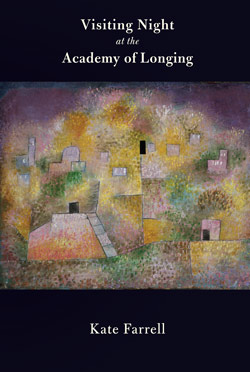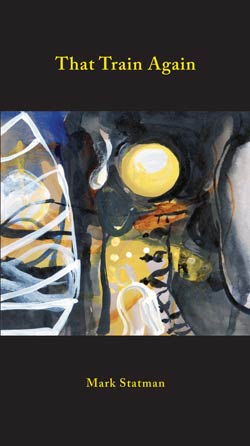Description
Mark Statman
Volverse / Volver
ISBN 978-1-956921-45-8 (pbk.)
166 pages: $19.95
April 1, 2025 (Pre-order pricing through March 1, 2025)
Volverse/Volver (Becoming/Return) is the third of Mark Statman’s metaphysical, lyrical Mexican books, one in which he “addresses our historical moment, his dual life in Mexico and the U.S., and the intimacies, personal and environmental, that bind us to others and to the world.” (Jesse Lee Kercheval). The exile and home of the hechizo worlds deepen with weight and counterweights, liberations and deliberations, of life, death, landscape and breath.
Praise for Mark Statman
In this haunting, vivid new collection, Volverse/ Volver, Mark Statman addresses our historical moment, his dual life in Mexico and the U.S., and the intimacies, personal and environmental, that bind us to others and to the world. Becoming and returning, Statman moves through grief and loss towards a renewal in a book charged with exultation and tenderness.
—Jesse Lee Kercheval
Begin with “song dance” and you fly at once enchanted, and if it’s a dance with apples peaches pears Buddha and hallelujah choruses, which Mark Statman gives us, how can one not stand up and look at the sky, the stars, the universe, as one has never seen before? This book is a cosmos book, or at least the world through a constant shifting and moving of language through “sun worship / and rain.” It doesn’t explain it all to us, but takes us there, opens our senses. A gift of “lives lived,” of “contradictions of philosophy,” of belief that our roads lead somewhere, our stories (“subtle without logic”) are imaginations beyond what we had imagined. Not that all is fruit and roses, for sometimes bodies of our loved ones, not well, make us aware of ends, of the end. But because of the gifts we know, when time calls us, “we’ll be there,” knowing and saying the names of the angels and saints. So come along, “out the door,” “come with come / along come gone.” Don’t miss this gorgeous book of amazement in this and “countless worlds.” Go and gone . . . and come back.
—Charles Alexander
Arriba, en la montaña, bajo el cielo de Monte Albán, la voz del poeta nombra el valle: identifica las cosas y a los dioses de su nuevo hogar. Lo sucedido antes, fuera de un mundo percibido en otro idioma, el español, no queda atrás, entra plenamente en el paisaje. Volverse/Volver reconcilia el ayer y el presente con la naturalidad de un trueno. Con este libro, de poderosa nostalgia, el poeta Mark Statman nos deja ver que lo sagrado palpita en el tiempo, y en toda cotidianidad.
—Araceli Mancilla Zayas
Everything builds in Volverse/Volver, inexorably, grievingly, and in the end triumphantly. The last section, “Embrujo,” is striking and moving beyond words. This is the mature work of a man coming to terms with love, pain, sorrow, mortality, and, yes, God. I can offer nothing but congratulations.
—Pablo Medina
Writing from Oaxaca where he can see the night sky Mark Statman calls in all the planets all the stars all the local goddesses and gods to help him situate the soul and us.
someone wrote me to/say how tired they//were of politics on /earth I thought of /the politics of /heaven and hell /politics of the /sun the moon and /Venus Jupiter stars
Turning and turning these nervy nervous skinny poems roll out scrolls of the inner voice to bless each moment at the tip of the tongue.
—Rodger Kamenetz
The México we hold in our hands in Hechizo is emblematic of palpable realities that endure and soar, revive and inscribe, resurrect and direct the energy of an entire region, which the poet inhabits physically and poetically.
—Gabriella Gutiérrez y Muhs, Cultural Daily
Jagged, unfettered, letting its art stem from the soul…The vision and soundscape of Hechizo are full of desire and spirituality, touch and yearning, attack and tranquility, and, above all, irrefutably, tremendously alive. There is ecstasy, but so unhindered as to be free and verge on anonymity.
—Nicholas Birns
The spell of Mark Statman’s magical, marvelously absorbing Hechizo begins with Furies and ends in Love. The poems casual yet perfectly poised short lines engender a sense of unbreakable continuity, until there’s “nothing/left but ash and/unmoving angelic their/feathered wings” as they bring all opposites together “when change/and the same are/the same.” They are an endless source of delight.
—John Koethe
The poems in Statman’s beautiful new book Hechizo occupy the thin place between life and death, dream and waking, love and loss. His words cast a spell on the reader; one can hear the music in each line—as if there were a voice emanating from the page. In his work, the Mexican landscape is pulsating with life, but so are the recently and long dead, as well as vibrant memories of life and people left behind. …to read this book is to remember what it feels like to be fully alive.
—Joanna Fuhrman
A hechizo is, for good or ill, a spell, a kind of magic cast into or from life’s uncertainties, an act of language, eliciting both the furies of a corrupt world and the redemptions of love, poetry in its earliest and most enduring form. Mark Statman’s Hechizo draws on both types of spells with an urgent lyricism , at once quick-moving and inclusive. There is a unique capacity here for engaging the furies of the social and political fully with the self, a measure of judgment and complicity, akin to the morally complex rhapsodic traditions of modern poetry in Spanish, which Statman successfully engaged with as a translator. The collection ends with a section of love poems, also called “Hechizo,” redemptive but hardly certain, the prospect of love, for his parents, for two strangers sighted in the park, for himself. This is a powerful collection, personal, in the best, most richly evolved sense.
—Michael Anania
Como todo conocedor de su oficio, el poeta Mark Statman sabe que la estructura que sostiene al mundo es el lenguaje, sabe que sólo así podemos conocerlo, admirarlo, actuar en él. Como todo conocedor de su oficio. Statman sabe que un poema es una acción ritual, una fórmula precisa que abre en algún grado nuestro horizonte de realidad. Eso es Hechizo.
—Efraín Velasco
Mark Statman’s Exile Home is a love poem, a snapshot, to the poet’s adopted country so fresh in the poem “Mi México”. The air, the light, the poignancy of little girl with wooden bowl, & mystery of life next to another, a beloved partner, buzz with sharp grace. A contrast across the border, with family loss, but no walls, here. Power of “all the unseen…writ in glass in water clouds” join the fiesta. No ideas but in things. I want to go there too. This is a sweet and pungent sensory exile, almost a dream.
—Anne Waldman
Exile Home is an elegiac journey of discovery: “the room / that lights / the house” is the possibility of coming to be who you are in whatever place we find ourselves. These are poems of transition as a form of mediation and meditation. Mark Statman’s short lines mark the flux of sentiment as openness to what’s next. “can you believe / we live like this”? Only time tells.
-–Charles Bernstein
Mark Statman’s fiercely elegiac book begins with the long poem, “Green Side Up,” dedicated to his father. Written in lower case with no punctuation, it provides quick flashes of family memory and the present reality of grief. The reader is utterly absorbed and lifted: “on the phone / you say it’s/ another DIP / day in paradise / waking early enough / there were no / sounds of morning / only birdsong breeze / the meaning of paradise / that first moment / alone and taking in / coffee and sunlight.” This is realism in the most beautiful sense. We are taken to the living moment as it passes. Italo Calvino wrote of “the moral values invested in the most tenuous traces.” It’s in “the intensity of minor acts” (John Ashbery) that we are folded into the cloak of truth: “we did this / we did this / it happened / before we thought it.” It was “a voice made for radio”: “Al Statman here / good morning.”
—Paul Hoover
At his best, Mark Statman whimsically seduces us to plug what large emptiness we carry into the day. Such a playfulness of spirit and sound, not yet outlawed in these parts, lifts us toward some unforeseen feeling or study of human life that would have eluded us, were it not for his sparse and controlled lines. Here is an eclectic imagination that redeems the conventional exploits of language and all the dead zones around us. Exile Home consecrates Statman’s forever voice.
—Major Jackson
Sieve-like and shifty language with more directness and clarity than obfuscation and obtuseness. The father poem of Exile Home, “Green Side Up,” is a triumph of courage and poetry and love. From it the manuscript opens like a flower of multiple petals. I am enthralled by a seeming innocence and a creeping wisdom, which, rather than distort the innocence, strengthens it. After all, we have the choice to see the world as unconcerned about our troubles in it. It is the world, not a bark on which we float toward happiness. An assertion of the will to see hope as language-driven, music-clad. Mr. Yeats and his wind-up birds. There are many drowsy emperors out there.
—Pablo Medina
To date, in spite of an incredibly productive and much lauded career as a poet, Mark Statman’s greatest claim to fame is his astonishing translation, with Pablo Medina, of García Lorca’s Poet in New York. Exile Home changes all that.
—John Yamrus
Although the poems in Mark Statman’s lovely That Train Again break down into sections and titles, you could almost read this book as a long, sweet poetic day of meditation; earth sky, birds, winds, wife, love, and the ways they attach themselves to the poet and, through him, to us. A good book of poetry will urge us not to miss the fine details. Here is music to slow the pulse and re-tune the ear to what is important.
—Cornelius Eady
Mark Statman’s spare, candid poems speak of the ways a person moves “from fold/into blue.” That Train Again details out daily translation of “world/into world.”
-–Idra Novey
Mark Statman’s voice brings together historical awareness with mindful surrender for the present moments (that sometimes calls back memories from psyche’s depths). Mark Statman’s lines are maps of the wind that carry us into wonder and love.
—Aliki Barnstone
Sung through a register of gentle if unrelenting consciousness on the part of the poet that the present is always inexhaustibly on the move, Statman’s spare, concise, searching poems channel notations of experience through the visual and aural senses.
—Anselm Berrigan
Statman’s voice is a kind of spare lyricism that reminds me of the ancient Greek poets of the Anthology or the concise voicings of Antonio Machado.
-–Joseph Stroud
…an admirably light touch illuminates the seriousness behind the poems…
–Tony Towle
Mark Statman delivers the tourist’s wonder and distance in spare deliberate music—American’s grand plain poetry descended from William Carlos Williams to James Schuyler. Statman is a head-on poet willing to risk clarity in pursuit of the marvelous we might encounter anywhere.
—William Corbett
Statman gives us language as commitment, commitment as imagination, imagination as soul-making
—Joseph Lease
It’s very rare to watch the birth of a new style. It’s like watching through new set of Proust’s kaleidoscopes. Mark Statman has been working for years on a vision of himself and parts of the city—concentrated and bare as any poetry. It’s hard to compare it to anything else.
—David Shapiro






Reviews
There are no reviews yet.